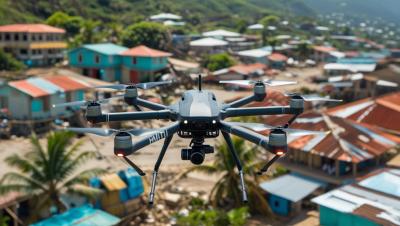
Haiti has turned to the privatized military industry to take on criminal gangs that have been fuelling a crisis of violence and hunger throughout Port-au-Prince and around the country. The Haitian government signed a contract this year with Erik Prince, a private military contractor and founder of Blackwater Worldwide, a company notorious for its privatized military operations in Iraq and Afghanistan.
The contract includes Prince sending 150 private mercenaries to Haiti this summer, providing advice to Haiti’s police force on countering the gangs, and support with the operation of drone attacks to take out gang leaders. Erik Prince has reportedly been contacting US Army veterans and Haitian-Americans to hire to work as private military contractors (or mercenaries); Rodenay Joseph, a US Army veteran confirmed that Prince contacted him directly. Mr. Joseph expressed concern about this type of outsourcing of work to private military contractors, highlighting that it doesn’t improve the skills of the Haitian police and military: “When you do it this way, it’s trouble,” he said, “Every time you parachute knowledge in and parachute out, the locals will always be in need of that knowledge. If you don’t have knowledge of security, you will just have a bunch of dead people.”
While Prince recruits mercenaries from the Haitian diaspora, the drone program is already underway and has largely been unsuccessful; according to the New York Times, “not a single high-value target has been killed or captured.” Prince has operated in the privatized military and security industry for several decades. Blackwater Worldwide is responsible for a massacre in Iraq nearly 20 years ago that killed 17 civilians. Mr. Prince sold Blackwater Worldwide in 2010, but has remained in the mercenary business, running military ventures in Libya, Afghanistan, and now Haiti. He donated $250,000 to Trump’s campaign and has pitched various military ventures to the US government, including outsourcing the transport of migrants to prisons in El Salvador.
What exactly is a mercenary, and who utilizes them? A mercenary, according to Sean McFate, an expert on the topic, is an armed civilian paid to do military operations in a foreign conflict zone. Their work includes multinational companies hiring private security firms to safeguard their assets. McFate says, “the market for force has moved beyond Blackwater in Iraq and become more lethal. Mercenaries are appearing everywhere…[it is the] marketization of war, where military force is bought and sold like any other commodity.”
Mercenaries often operate outside of an oversight structure. In the case of Haiti, the Haitian government lacks the capacity for oversight, and without clear US involvement, this means Erik Prince has no accountability if issues arise. A Haiti security analyst at the Global Initiative Against Transnational Organized Crime, Romaine Le Cour said, “It is a blurry framework, lacking any accountability and legal backing.” The signed contract between Erik Prince and the Haitian government is not public record, so we’re unable to verify the involvement of the US government, though based on the United States’ history of interference in this region of the world, we remain curious about the US government’s role. Quixote Center doubts the Haitian government would sign a contract with Prince without, at minimum, approval from the United States.
The use of outside private military contractors (mercenaries), paramilitary forces, and occupation forces has a deep and messy history in Haiti. While paramilitary forces and mercenaries are not exactly the same thing, there is some overlap. A paramilitary force is a group organized like a military but not part of a country's official armed forces, and can be used for private security, while a mercenary is an individual who is hired to fight for profit, often for a foreign entity. The United States established a pattern of using outside or private military forces to provide security for elites and outside interests in Haiti during the United States occupation (1915–1934) of Haiti, which created a modern Haitian military to serve as a proxy enforcer of US interests.
Over the decades, the US continued to train and equip paramilitary forces, the Tonton Macoutes and the Leopards, under the Duvalier dictatorships. Notably, the Leopards worked through a Miami company under a CIA contract with oversight from the US Department of State. Despite a brief democratic breakthrough in 1991 with the election of Jean-Bertrand Aristide, Haiti’s pro-democracy movement faced two US-backed coups and continued paramilitary violence. These forces were often aligned with Haiti’s bourgeoisie and international actors. More recently in 2021, Colombian mercenaries were reportedly hired through a US-based firm and implicated in the 2021 assassination of President Jovenel Moïse.
Haiti’s oligarchs and elites also have long ties to mercenaries, who enable their control over an estimated 90% of Haiti’s wealth. Unsurprisingly, this group of oligarch families has sophisticated international support, including ties to U.S. lawyers and bankers in Miami that help move wealth through offshore companies. There is a lack of media attention to the oligarchs in Haiti and their ties to mercenaries, with many mainstream news outlets opting not to highlight this system of corruption or name the families. These families are among those engaging in illegal arms trafficking and supplying the criminal gangs ravaging the country.
Quixote Center recognizes the desperate situation. However, we remain deeply concerned over Haiti’s long history of mercenaries, private security forces, and paramilitary forces that have only made the situation more troubling over the years. Haiti’s decision to turn to Mr. Prince’s operation for support will likely not result in the outcome that is most needed for the people of Haiti. Halting the illegal flow of guns and ammunition, which includes halting the financing, is the fastest and most peaceful path to end the violence and gang control in Haiti. For more information on U.S. legislative efforts to this end, please take action on our website and tell your representative to support and co-sponsor the Haiti Criminal Collusion Transparency Act, which addresses the financing.



Comments
Anne Hastings (not verified)
Dear Chelsea, Many thanks for this post. From the very first time hearing about mercenaries in Haiti, I was so disturbed. I agree with you that this is NOT what the country needs both because it is not a long-term solution and because it most certainly holds the possibility of many more human rights abuses. Yet I have had many people ask me: "But isn't that a good thing that might help control the gangs?" People don't understand that the gangs include many young children and others who are just trying to find a way to feed their families, which the gangs can help with. Moreover, if the oligarchs and the US govt hadn't created and then supported the gangs -- all the way back to the Tonton Macoutes -- we wouldn't be in this situation today. So thank you.
Quixote Center (not verified)
Thanks for your comment Anne. We appreciate your support!
David-Ross Gerl... (not verified)
What an engaging and historical essay on Haiti today-or more accurately, the Haiti that never changes. Every one of our US administrations, past and present, has maintained Haiti as a virtual slave colony and then react with hypocritical alarm when more and more Haitians listen to the Créole edition of Radio Habana. The US is the toxic and now genocidal plantation overseer of this beautiful isle with some of the most astonishing people on the planet. One month of the money wasted on Ukraine could liberate Haiti through small business grants and medical grants. Our pope, who has a connection to Haiti must intervene.
David-Ross Gerling, PhD
Quixote Center (not verified)
Thank you for your comment David. Virtual slave colony is exactly right.